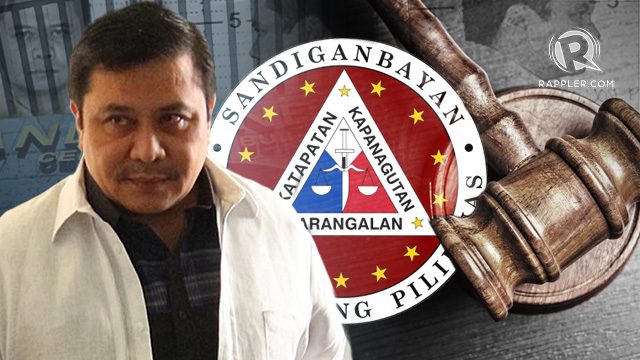SUMMARY
This is AI generated summarization, which may have errors. For context, always refer to the full article.

The Sandiganbayan Fifth Division granted bail to Senator Jinggoy Estrada, ruling that there was no strong evidence against him. Using a straightforward reasoning, the anti-graft court ruled he was not the “main plunderer.” The Sandiganbayan also ruled that he, as a senator, is not a flight risk, and thus poses no danger of escaping. Finally, the court also noted that he had languished in jail for 3 years, even without being convicted, which presumably violates his constitutional rights to presumption of innocence and speedy trial.
At face value, there is nothing legally wrong with these arguments. In fact, long-time advocates of criminal justice reform have been railing against the problem of prolonged trial detention of unconvicted inmates.
The length of trial procedures in the Philippines, sadly, is one of the longest in the world. In one local jurisdiction in Metro Manila in July 2017, for example, 580 of 4,054 (or 14%) detained inmates had languished in jail for more than 3 years. Twenty-one of them had stayed in jail for more than 10 years. The longest staying inmate during that time had languished in jail for 15 years, 4 months, and 22 days. All these inmates are undergoing trial and are presumed innocent. Majority of these inmates are charged with non-violent offenses. In this same jurisdiction, it took 1,274 days (or 3.5 years) for 735 inmates who were detained in this jail between 2007 and 2016 to be declared not guilty. Thus, they had stayed in jail that long only to be found innocent. One inmate was acquitted after languishing in jail for 12 years.

Thus, long-time advocates had been begging the judicial system to look into this nagging problem. The delay in trial procedures translates to jail population congestion. The male facility of this jurisdiction has a rated capacity of 280 inmates but accommodates close to 3,200 inmates. The female facility has a rated capacity of 80 inmates but now houses 850 inmates. These is above 1,000% over-congestion, a humanitarian crisis of epic proportions.
Jail overcrowding, on the other hand, translates to a host of other related problems in jail management. These include insufficient custodial supervision, limited rehabilitation programming, and exposure to criminogenic jail environment. While inside the jail, inmates learn new tricks in the criminal trade and learn how to beat the legal system, which increase their risk of recidivism. Some of the more moneyed and influential inmates, even if they committed heinous crimes, eventually find loopholes in the prolonged procedure, and get themselves freed.
All these factors eventually translate into a distrust of the legal system as it becomes inefficient, iniquitous, and corrupt. The Filipino public thus becomes legally cynical. This cynicism is manifested by such notions as “it is okay to kill drug dealers because they will simply beat the justice system anyway,” “It is okay to kill the criminals because they just keep on returning to jail,” or “It is okay to kill addicts because they had been warned and did not change ways.” These narratives are accepted by an angry public and had been masterfully stroked to justify extra judicial killings.
If the Sandiganbayan can rule for the release of Senator Jinggoy Estrada based on the fact that he had languished in jail for more than 3 years, then all courts nationwide should look at the cases of ordinary Filipinos who had languished in jail for far longer period, under harsher conditions, and for even less serious offenses. If they can release Senator Jinggoy Estrada, who was alleged to have plundered millions of pesos, then they should release an inmate charged with theft of P20,000 who had languished in a local jail for 4 years, 3 months, and 7 days, and many other inmates similarly situated.
There is nothing legally wrong with the bail release of Senator Jinggoy Estrada. But if we apply this legal reasoning to one Filipino senator who was charged with a non-bailable offense of plunder, then we should apply this to every Filipino who languish in our decrepit overcrowded jails. Otherwise, the thought that he was released – simply because he could beat the legal system, because his lawyers were able to use legal gobbledygook, because he was finally connected to the dispenser of the political power – will simply further the cynicism about the legal system. This selective justice will further erode trust in our legal institutions.
The issue is not about his release on bail. He deserves it because he had languished without being convicted.
The issue is the selective application of this legal reasoning. The issue is selective justice that this current government supposedly rails against.
By releasing Senator Jinggoy Estrada, this current government is making a mockery of the criminal justice even more. Paradoxically, this government utilizes the narrative of a “failed justice system” to rationalize its extrajudicial killings. As one inmate said: iginisa sa sariling mantika.
This should not be an issue of Dutertards versus Yellowtards. This is the issue of ordinary Filipinos whose elitist government, past and present, continue to fail them. – Rappler.com
Raymund E. Narag, PhD, is assistant professor at the Department of Criminology and Criminal Justice, Southern Illinois University Carbondale.
Add a comment
How does this make you feel?
There are no comments yet. Add your comment to start the conversation.